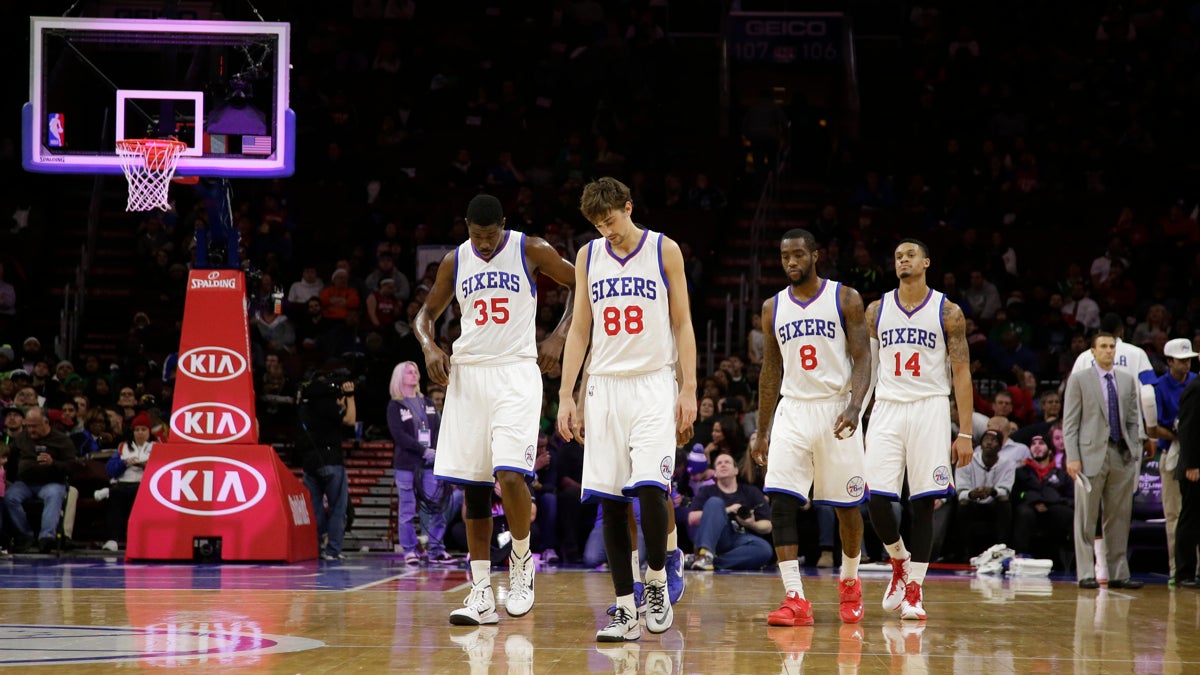How repeated losing affects our body chemistry
Listen
Philadelphia 76ers' K.J. McDaniels in action against the Boston Celtics Wednesday in Philadelphia. (Matt Slocum/AP Photo)
The Philadelphia 76ers can’t seem to win and the team’s losing streak might be affecting the body chemistry of its young would-be stars.
The 76ers are not doing well. They have a laughable two wins and 22 losses.
After a recent thrashing at the hands of the Boston Celtics, Coach Brett Brown couldn’t even muster the energy to pretend to be proud of his team.
“It was the first time for me in a while where you try to search for answers and I didn’t have any,” said Brown. “I really didn’t.”
The team’s controversial strategy for success is well documented. They’re tanking. That means they’ve traded away all of their good veteran players in the hopes of drafting good, young players in the future.
If they do badly enough this year, the team will probably end up with one of the top three draft picks next year. They already have four recent first rounders on the team. All have talent, but they’re young and raw, and without veterans around them, they don’t have much of a chance right now.
The plan is to have enough good players mature at the same time that the Sixers will be a dominant team in three or four years.
But here’s the problem with that plan, according to Professor Ian Robertson.
“Your self concept changes gradually from being that of a winner to being that of a loser,” he said.
Robertson is Chair of Psychology at Trinity College in Dublin, Ireland. He’s also author of the book “The Winner Effect: The Neuroscience of Success and Failure.” He says both winning and losing can have real effects on the body.
“And that’s because it turns out that winning actually generates an increase in testosterone in your body in both men and women, and that in turn increases dopamine levels in what’s called the reward network in the brain, which means that the next time you win, the testosterone that you have will have a bigger effect and make you more motivated, more aggressive, and hence more likely to win.”
That’s when you win. But when you lose…
“Losing produces a surge of the stress hormone cortisol. So losing is very painful, and you get actually a dip in the dopamine activity,” says Robertson.
Now, if athletes are lucky, their bodies will rally and produce enough testosterone to get you back your competitive edge.
“But if you’ve been in a situation of repeated losing, you’re likely to have a much less prolonged or a much lower rise in testosterone in anticipation of the crash, and in fact you’re more likely to have an anticipatory burst of cortisol, the stress hormone, which may actually interfere with your performance,” he says.
In other words, by losing again and again, these players may actually be teaching their bodies to sabotage themselves. Remember, some of those players are ones the franchise intends to keep. They’re players who came into the league at the very top of their sport. Most have been identifying themselves as winners for a long time. And now, all of a sudden, they’re not.
It doesn’t really take a neuroscientist to draw this conclusion. In a recent commentary, ESPN’s Adnan Virk contended the strategy sounds absurd from a psychological perspective.
“Do you think you can just acquire callow youth, have them brow-beaten into submission, pummeled by the pain of nightly thrashing, and then a light switch will come on, and you can say presto, it’s time for us to contend now. Just doff your loser hats and put on that winning smile,” said Virk.
Well, sports psychologist Dr. Cory Bank says that actually might be possible.
“You have to have the team view this challenge optimistically versus pessimistically.”
Bank says if the team brass goes to great pains to paint a bright picture of the future, the players could rebound—so to speak.
“So if they’re a pessimist, we’re losing because we’re awful, this is going to last for years and years and years and decades and decades, and it’s going to affect my psychological health, my physical health, my relationships with my family, my relationships with my teammates,” says Bank.
But, he says, optimists have a different point of view.
“They look at this challenge as external. We’re a very young team, and it’s external. And it’s also temporary. It might be a month or two months or a year, but this is not going to be my entire career.”
Whether Sixers fans believe in the tanking strategy or not, they can probably look forward to many more games like the one I saw–a game where the highlight might just have been the t-shirts shot out of a cannon.
WHYY is your source for fact-based, in-depth journalism and information. As a nonprofit organization, we rely on financial support from readers like you. Please give today.



